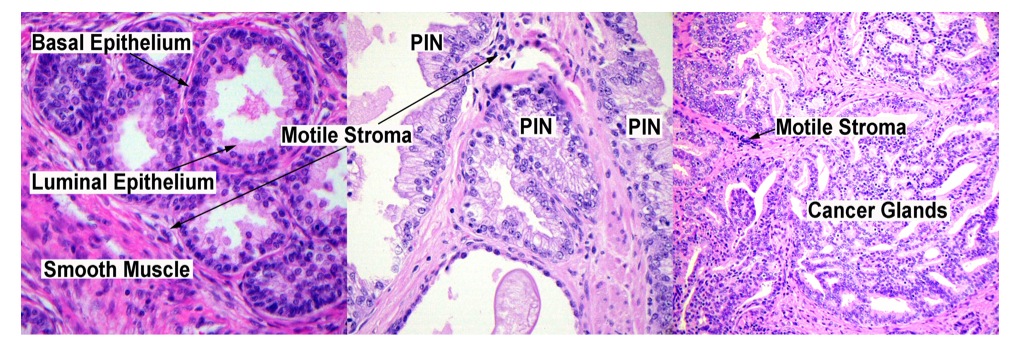David Basanta
The evolutionary dynamics of cancer
My main scientific interest is Evolution in the Darwinian sense of the word. Although the role of evolution in diseases like cancer is known, a proper understanding of its consequences remains a major oversight in cancer research. Be it because the current focus lies on the genetic bases of cancer or because studying evolution experimentally is not easy, the evolutionary reasons behind cancer initiation and progression remain poorly understood.
The role of the stroma in cancer progression
 Genetic mutations allow otherwise healthy cells to start ignoring and working against the homeostatic mechanisms of the tissue. Stromal cells play an important role in maintaining this homeostasis so cancer progression towards malignancy requires that tumor-stroma interactions can, at worst be disrupted and at best, co-opted for tumor growth. Together with Hayward's lab at Vanderbilt University, Ayala's lab at Baylor College of Medicine and Smalley's lab at Moffitt I develop models that study these interactions and the results of perturbing them.
Genetic mutations allow otherwise healthy cells to start ignoring and working against the homeostatic mechanisms of the tissue. Stromal cells play an important role in maintaining this homeostasis so cancer progression towards malignancy requires that tumor-stroma interactions can, at worst be disrupted and at best, co-opted for tumor growth. Together with Hayward's lab at Vanderbilt University, Ayala's lab at Baylor College of Medicine and Smalley's lab at Moffitt I develop models that study these interactions and the results of perturbing them.
One example is an agent based model (using a Hybrid Discrete-Continuum Cellular Automaton approach) to study the role of TGF-&beta mediated tumor-stroma interactions in prostate cancer. Our results showed that while TGF-&beta might play an important role once the tumor cells escape from the prostatic gland, it still plays a significant one in driving motile stroma to block tumor escape.
In another piece of research we used Evolutionary Game Theory to investigate how co-optable stromal cells such as Carcinoma Associated Fibroblasts (CAF) could play a role in determining whether a tumor would evolve towards stromal independent malignant phenotypes or towards stromagenic ones. Our results show that CAFs can promote the emergence of stromagenic tumors even when existing resources would normally select for microenvironmentally independent phenotypes but that this CAF-tumor cooperation could be disrupted by fit microenvironmentally independent cells.
We are also currently studying the role of aging in carcinogenesis. Fibroblasts are important in maintaining tissue homeostasis. As they age they start secreting factors that favor transformed and premaligant tumor cells thus switching their function from cancer preventing to cancer promoting. We are investigating how heterogeneous populations of fibroblasts become cancer promoting after they age.
The evolutionary origins of metastasis
 Evolution plays a role in the evolution of phenotypes that are capable of successfully metastasizing in a different organ. Paget's Seed and Soil hypothesis - that the soil (the tissue in which a metastatic cell tries to grow) can be as important as the seed (the metastatic cell) in explaining what makes an attempt of metastasis successful, is something we are trying to elaborate on.
Evolution plays a role in the evolution of phenotypes that are capable of successfully metastasizing in a different organ. Paget's Seed and Soil hypothesis - that the soil (the tissue in which a metastatic cell tries to grow) can be as important as the seed (the metastatic cell) in explaining what makes an attempt of metastasis successful, is something we are trying to elaborate on.
We are using HCA and EGT models to study how the environment of origin shapes the evolutionary dynamics that select of tumor phenotypes that get the opportunity to intravasate. Using network theory we are aiming to understand how the blood vasculature biases the distribution of circulating tumor cells originating from certain organs. Using EGT we take the phenotypical strategies we obtained in the intravasation game and we study the types of environments in which subsets of these phenotypes could successfully colonize and grow a new organ.
Selected Publications
1. Anderson A, Hassanein M, Branch K, Lu J, Lobdell N, Maier J, Basanta D, Weidow B, Narasanna A, Arteaga C, Reynolds A, Quaranta V, Estrada L, Weaver A. Microenvironmental independence associated with tumor progression. Cancer research 69 (22), 8797-806 (2009) [link].
2. Basanta D, Strand D, Lukner R, Franco O, Cliffel D, Ayala G, Hayward S, Anderson A. The Role of Transforming Growth Factor- -Mediated Tumor-Stroma Interactions in Prostate Cancer Progression: An Integrative Approach Cancer Research 69 (17) , 7111 - 7120 (2009) [link].
3. Basanta D, Hayward S, Ayala G, Anderson A. Stromal tumour cooperation and its role in the evolutionary dynamics of carcinomas. Mathematical Medicine and Biology. Submitted.